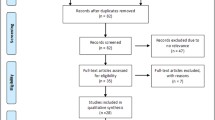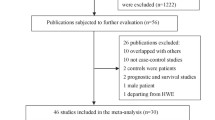Abstract
Mutations in RAD51 gene are believed to be associated with elevated breast cancer risk. However, several case–control studies focusing on the association between RAD51 135G>C and breast cancer risk failed to achieve consensus. To clarify the effect of RAD51 135G>C polymorphism on breast cancer, a meta-analysis was performed. By searching PubMed and EMBASE, a total of 14 case–control studies, containing 12,183 cases and 10,183 controls, were included. The strength of association between RAD51 135G>C polymorphism and breast cancer risk was assessed by odds ratio (OR) with the corresponding 95% confidence interval (95% CI). When all the eligible studies were pooled into the meta-analysis, an elevated cancer risk was revealed in additive model (OR, 1.34; 95% CI, 1.01–1.78; P = 0.044) and recessive model (OR, 1.37; 95% CI, 1.03–1.82; P = 0.032). In subgroup analyses by ethnicity, BRCA1/2 mutation status, and family history, a significant association was found only among BRCA2 mutation carriers (additive model: OR, 4.92; 95% CI, 1.11–21.83; P = 0.036; recessive model: OR, 4.88; 95% CI, 1.10–21.67; P = 0.037). Sensitivity analysis did not perturb the results. In conclusion, this meta-analysis suggests that RAD51 variant 135C homozygote is associated with elevated breast cancer risk among BRCA2 mutation carriers.



Similar content being viewed by others
References
Hughes DJ (2008) Use of association studies to define genetic modifiers of breast cancer risk in BRCA1 and BRCA2 mutation carriers. Fam Cancer 7:233–244. doi:10.1007/s10689-008-9181-0
Baumann P, West SC (1998) Role of the human RAD51 protein in homologous recombination and double-stranded-break repair. Trends Biochem Sci 23:247–251. doi:10.1016/S0968-0004(98)01232-8
Thacker J (2005) The RAD51 gene family, genetic instability and cancer. Cancer Lett 219:125–135. doi:10.1016/j.canlet.2004.08.018
Hasselbach L, Haase S, Fischer D, Kolberg HC, Sturzbecher HW (2005) Characterisation of the promoter region of the human DBA-repair gene RAD51. Eur J Gynaecol Oncol 26:589–598
Wang WW, Spurdle AB, Kolachana P, Bove B, Modan B, Ebbers SM, Suthers G, Tucker MA, Kaufman DJ, Doody MM, Tarone RE, Daly M, Levavi H, Pierce H, Chetrit A, Yechezkel GH, Chenevix-Trench G, Offit K, Godwin AK, Struewing JP (2001) A single nucleotide polymorphism in the 5’ untranslated region of RAD51 and risk of cancer among BRCA1/2 mutation carriers. Cancer Epidemiol Biomarkers Prev 10:955–960
Kadouri L, Kote-Jarai Z, Hubert A, Durocher F, Abeliovich D, Glaser B, Hamburger T, Eeles RA, Peretz T (2004) A single-nucleotide polymorphism in the RAD51 gene modifies breast cancer risk in BRCA2 carriers, but not in BRCA1 carriers or noncarriers. Br J Cancer 90:2002–2005. doi:10.1038/sj.bjc.6601837
Levy-Lahad E, Lahad A, Eisenberg S, Dagan E, Paperna T, Kasinetz L, Catane R, Kaufman B, Beller U, Renbaum P, Gershoni-Baruch R (2001) A single nucleotide polymorphism in the RAD51 gene modifies cancer risk in BRCA2 but not BRCA1 carriers. Proc Natl Acad Sci USA 98:3232–3236. doi:10.1073/pnas.051624098
Antoniou AC, Sinilnikova OM, Simard J, Léoné M, Dumont M, Neuhausen SL, Struewing JP, Stoppa-Lyonnet D, Barjhoux L, Hughes DJ, Coupier I, Belotti M, Lasset C, Bonadona V, Bignon YJ; Genetic Modifiers of Cancer Risk in BRCA1/2 Mutation Carriers Study (GEMO), Rebbeck TR, Wagner T, Lynch HT, Domchek SM, Nathanson KL, Garber JE, Weitzel J, Narod SA, Tomlinson G, Olopade OI, Godwin A, Isaacs C, Jakubowska A, Lubinski J, Gronwald J, Górski B, Byrski T, Huzarski T, Peock S, Cook M, Baynes C, Murray A, Rogers M, Daly PA, Dorkins H; Epidemiological Study of BRCA1 and BRCA2 Mutation Carriers (EMBRACE), Schmutzler RK, Versmold B, Engel C, Meindl A, Arnold N, Niederacher D, Deissler H; German Consortium for Hereditary Breast and Ovarian Cancer (GCHBOC), Spurdle AB, Chen X, Waddell N, Cloonan N; Kathleen Cuningham Consortium for Research into Familial Breast Cancer (kConFab), Kirchhoff T, Offit K, Friedman E, Kaufmann B, Laitman Y, Galore G, Rennert G, Lejbkowicz F, Raskin L, Andrulis IL, Ilyushik E, Ozcelik H, Devilee P, Vreeswijk MP, Greene MH, Prindiville SA, Osorio A, Benitez J, Zikan M, Szabo CI, Kilpivaara O, Nevanlinna H, Hamann U, Durocher F, Arason A, Couch FJ, Easton DF, Chenevix-Trench G; Consortium of Investigators of Modifiers of BRCA1/2 (CIMBA) (2007) RAD51 135G > C modifies breast cancer risk among BRCA2 mutation carriers: results from a combined analysis of 19 studies. Am J Hum Genet 81:1186–1200. doi:10.1086/522611
Jakubowska A, Jaworska K, Cybulski C, Janicka A, Szymańska-Pasternak J, Lener M, Narod SA, Lubiński J, IHCC-Breast Cancer Study Group (2009) Do BRCA1 modifiers also affect the risk of breast cancer in non-carriers? Eur J Cancer 45:837–842. doi:10.1016/j.ejca.2008.10.021
Costa S, Pinto D, Pereira D, Rodrigues H, Cameselle-Teijeiro J, Medeiros R, Schmitt F (2007) DNA repair polymorphisms might contribute differentially on familial and sporadic breast cancer susceptibility: a study on a Portuguese population. Breast Cancer Res Treat 103:209–217. doi:10.1007/s10549-006-9364-z
Jakubowska A, Narod SA, Goldgar DE, Mierzejewski M, Masojć B, Nej K, Huzarska J, Byrski T, Górski B, Lubiński J (2003) Breast cancer risk reduction associated with the RAD51 polymorphism among carriers of the BRCA1 5382insC mutation in Poland. Cancer Epidemiol Biomarkers Prev 12:457–459
Jakubowska A, Gronwald J, Menkiszak J, Górski B, Huzarski T, Byrski T, Edler L, Lubiñski J, Scott RJ, Hamann U (2007) The RAD51 135G > C polymorphism modifies breast cancer and ovarian cancer risk in Polish BRCA1 mutation carriers. Cancer Epidemiol Biomarkers Prev 16:270–275. doi:10.1158/1055-9965.EPI-06-0562
Dufloth RM, Costa S, Schmitt F, Zeferino LC (2005) DNA repair gene polymorphisms and susceptibility to familial breast cancer in a group of patients from Campinas, Brazil. Genet Mol Res 4:771–782
Mantel N, Haenszel W (1959) Statistical aspects of the analysis of data from retrospective studies of disease. J Natl Cancer Inst 22:719–748
DerSimonian R, Laird N (1986) Meta-analysis in clinical trials. Control Clin Trials 7:177–188
Cochran WG (1954) The combination of estimates from different experiments. Biometrics 10:101–129
Tobias A (1999) Assessing the influence of a single study in the meta-analysis estimate. Stata Tecnol Bull 8:15–17
Egger M, Davey SG, Schneider M, Minder C (1997) Bias in meta-analysis detected by a simple, graphical test. BMJ 315:629–634
Gal I, Kimmel G, Gershoni-Baruch R, Papa MZ, Dagan E, Shamir R, Friedman E (2006) A specific RAD51 haplotype increases breast cancer risk in Jewish non-Ashkenazi high-risk women. Eur J Cancer 42:1129–1134. doi:10.1016/j.ejca.2005.09.035
Romanowicz-Makowska H, Smolarz B, Kulig A (2005) Germline BRCA1 mutations and G/C polymorphism in the 5’-untranslated region of the RAD51 gene in Polish women with breast cancer. Pol J Pathol 56:161–165
Romanowicz-Makowska H, Smolarz B (2006) Analysis of loss of heterozygosity and microsatellite instability RAD52, RAD54 and RAD54B gene and BRCA1 gene mutation in breast cancer. Pol Merkur Lekarski 21:548–550 Polish
Romanowicz-Makowska H, Smolarz B, Kulig A (2006) The G/C polymorphism of RAD51 gene in breast cancer. Pol Merkur Lekarski 21:55–58 Polish
Blasiak J, Przybyłowska K, Czechowska A, Zadrozny M, Pertyński T, Rykała J, Kołacińska A, Morawiec Z, Drzewoski J (2003) Analysis of the G/C polymorphism in the 5’-untranslated region of the RAD51 gene in breast cancer. Acta Biochim Pol 50:249–253
Romanowicz-Makowska H, Smolarz B, Zadrozny M, Kulig A (2006) Analysis of RAD51 polymorphism and BRCA1 mutations in Polish women with breast cancer. Exp Oncol 28:156–159
Synowiec E, Stefanska J, Morawiec Z, Blasiak J, Wozniak K (2008) Association between DNA damage, DNA repair genes variability and clinical characteristics in breast cancer patients. Mutat Res 648:65–72. doi:10.1016/j.mrfmmm.2008.09.014
Krupa R, Synowiec E, Pawlowska E, Morawiec Z, Sobczuk A, Zadrozny M, Wozniak K, Blasiak J (2009) Polymorphism of the homologous recombination repair genes RAD51 and XRCC3 in breast cancer. Exp Mol Pathol 87:32–35. doi:10.1016/jyexmp2009.04.005
Jara L, Acevedo ML, Blanco R, Castro VG, Bravo T, Gómez F, Waugh E, Peralta O, Cabrera E, Reyes JM, Ampuero S, González-Hormazábal P (2007) RAD51 135G > C polymorphism and risk of familial breast cancer in a South American population. Cancer Genet Cytogenet 178:65–69. doi:10.1016/j.cancergencyto.2007.05.024
Sliwinski T, Krupa R, Majsterek I, Rykala J, Kolacinska A, Morawiec Z, Drzewoski J, Zadrozny M, Blasiak J (2005) Polymorphisms of the BRCA2 and RAD51 genes in breast cancer. Breast Cancer Res Treat 94:105–109. doi:10.1007/s10549-005-0672-5
Jara L, Dubois K, Gaete D, de Mayo T, Ratkevicius N, Bravo T, Margarit S, Blanco R, Gómez F, Waugh E, Peralta O, Reyes JM, Ibáñez G, González-Hormazábal P (2010) Variants in DNA double-strand break repair genes and risk of familial breast cancer in a South American population. Breast Cancer Res Treat. doi:10.1007/s10549-009-0709-2
Kuschel B, Auranen A, McBride S, Novik KL, Antoniou A, Lipscombe JM, Day NE, Easton DF, Ponder BA, Pharoah PD, Dunning A (2002) Variants in DNA double-strand break repair genes and breast cancer susceptibility. Hum Mol Genet 11:1399–1407. doi:10.1093/hmg/11.12.1399
Lee KM, Choi JY, Kang C, Kang CP, Park SK, Cho H, Cho DY, Yoo KY, Noh DY, Ahn SH, Park CG, Wei Q, Kang D (2005) Genetic polymorphisms of selected DNA repair genes, estrogen and progesterone receptor status, and breast cancer risk. Clin Cancer Res 11:4620–4626. doi:10.1158/1078-0432.CCR-04-2534
Webb PM, Hopper JL, Newman B, Chen X, Kelemen L, Giles GG, Southey MC, Chenevix-Trench G, Spurdle AB (2005) Double-strand break repair gene polymorphisms and risk of breast or ovarian cancer. Cancer Epidemiol Biomarkers Prev 14:319–323. doi:10.1158/1055-9965.EPI-04-0335
Chang TW, Wang SM, Guo YL, Tsai PC, Huang CJ, Huang W (2006) Glutathione S-transferase polymorphisms associated with risk of breast cancer in southern Taiwan. Breast 15:754–761. doi:10.1016/j.breast.2006.03.008
Brooks J, Shore RE, Zeleniuch-Jacquotte A, Currie D, Afanasyeva Y, Koenig KL, Arslan AA, Toniolo P, Wirgin I (2008) Polymorphisms in RAD51, XRCC2, and XRCC3 are not related to breast cancer risk. Cancer Epidemiol Biomarkers Prev 17:1016–1019. doi:10.1158/1055-9965.EPI-08-0065
Hu R, Wei Y, Jiang WJ, Yao WX, Long QM, Zhang JH, Liang Y, Tang XL (2008) Association of polymorphisms of N372H in BRCA2 gene and 135G/C in RAD51 gene and breast cancers. Sichuan Da Xue Xue Bao Yi Xue Ban 39:973–975 Chinese
Akisik E, Yazici H, Dalay N (2010) ARLTS1, MDM2 and RAD51 gene variations are associated with familial breast cancer. Mol Biol Rep. doi:10.1007/s11033-010-0113-3
Wooster R, Weber BL (2003) Breast and ovarian cancer. N Engl J Med 348:2339–2347. doi:10.1056/NEJMra012284
Berlin JA, Santanna J, Schmid CH, Szczech LA, Feldman HI, Anti-Lymphocyte Antibody Induction Therapy Study Group (2002) Individual patient- versus group-level data meta-regressions for the investigation of treatment effect modifiers: ecological bias rears its ugly head. Stat Med 21:371–387
Author information
Authors and Affiliations
Corresponding author
Additional information
G.-W. Zhou and J. Hu equally contributed to this study.
Rights and permissions
About this article
Cite this article
Zhou, GW., Hu, J., Peng, XD. et al. RAD51 135G>C polymorphism and breast cancer risk: a meta-analysis. Breast Cancer Res Treat 125, 529–535 (2011). https://doi.org/10.1007/s10549-010-1031-8
Received:
Accepted:
Published:
Issue Date:
DOI: https://doi.org/10.1007/s10549-010-1031-8




